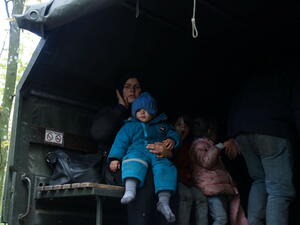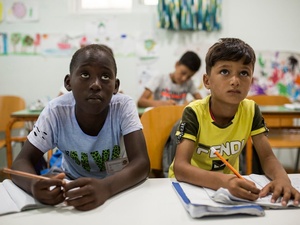UNHCR welcomes Latvia lifting geographical restriction on asylum
UNHCR welcomes Latvia lifting geographical restriction on asylum
The United Nations High Commissioner for Refugees today welcomed the Latvian Parliament's decision to amend its refugee law to allow non-European citizens to seek asylum in Latvia.
Latvia ratified the 1951 Convention on Refugees and its 1967 Protocol on 19 June 1997, but declared that it would provide asylum for European refugees only.
UNHCR had expressed concern about this restriction, as it considers that the application of refugee law should be universal. A refugee should be granted protection on the merits of his or her individual claim without discrimination based on country of origin.
The notion of restricting asylum to European refugees comes from the early days of the international refugee regime. When the 1951 Convention was adopted, UNHCR was formed to seek solutions mainly for the 1.2 million refugees scattered in Europe in the aftermath of the Second World War.
Although governments had the option of adopting a geographical limitation when ratifying the refugee Convention, only a few did so.
With the steady emergence of refugee situations outside Europe since 1951, the international community recognized the universal value of the refugee regime. The 1967 Protocol was drafted to extend the application of the Convention and the mandate of UNHCR to protect refugees other than those affected by events in Europe at the time of the Second World War.
Hungary, Malta and Turkey, however, applied the geographical limitation at the time of acceding to the 1951 Convention and its Protocol. UNHCR is hopeful that Hungary will soon adopt its first refugee law and formally withdraw the limitation.
Latvia, as well as Estonia and Lithuania, are facing large numbers of transit migrants and asylum-seekers travelling through porous borders since the break-up of the Soviet Union.
Confronted with tighter border controls in western Europe and without access to an asylum procedure in the Baltics, many asylum-seekers risk being detained as illegal migrants or becoming the victims of human trafficking.
In Latvia, more than a hundred migrants and asylum-seekers were packed aboard a train in 1995 which shuttled for weeks between Latvia and Russia with little food or sanitation. They were then placed in a detention centre until late last year, when Nordic countries agreed to resettle these refugees and Latvia began to establish refugee and asylum procedures.
UNHCR welcomed the accession of the three Baltic States to the refugee Convention earlier this year.




